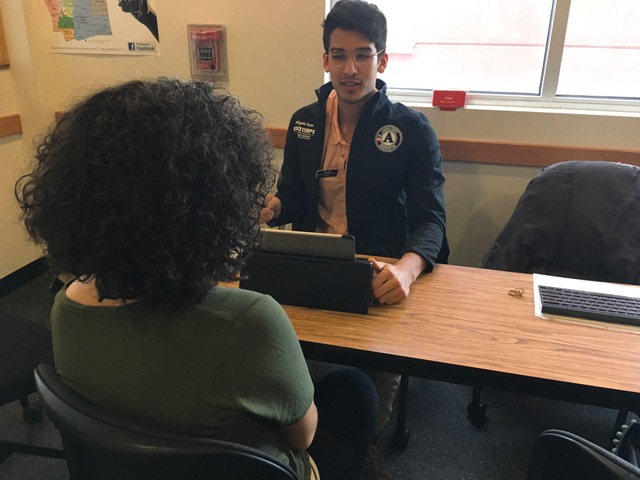June 27, 2018
A Story of Service

Howdy! My name is Samuel, and I am a specialist serving as an AmeriCorps on the Healthy Connections team whose mission at WithinReach is to connect families and individuals all over Washington State to basic resources to achieve healthy living.
My Outreach team members and I take part in this mission by traveling to food banks, community service offices, health clinics, and other sites in King and Snohomish County to help clients in person. There we meet with our community members, listen to their needs and assess how we can help them. After screening clients to determine what type of resources they might be eligible for, I can make referrals to those resources – primarily those involving health, food, and affordable transportation. We strive to be educated on the available community resources in order to ensure our clients are aware of any other support they can receive.
I recently had the opportunity to take part in an educational outreach event, presenting on food resources in Washington to the Ethiopian Community in Seattle (ECS). This experience, like many other outreach events, made me realize the significance of “meeting people where they are at” so as to connect available services to people who qualify for them.
As a person who is half-Ethiopian, I was particularly excited to get in touch with ECS – a non-profit organization that provides social services support to Ethiopian immigrants – a community whose culture I grew up with and am very fond of. As I entered the building, I felt a sense of warmth from seeing familiar images of cities in Ethiopia, the flag, some traditional food such as injera, and writing in the national language, Amharic. I met with the Programs and Community Engagement Coordinator, and shortly after set up my laptop for the presentation in the main room. The Executive Director kindly served as translator, and I proceeded to greet the assembled members of the room. There were 17 members in attendance, mostly elders and all 100% under the Federal Poverty Level (FPL). They were thrilled that I knew some Amharic and to hear my mother is Ethiopian. With the help of the translator, I went slowly through the slides discussing food resources such as Basic Food (food stamps), the supplemental nutrition program for Women, Infants, and Children (WIC), food banks, and some Farmers Markets programs.
We often discussed the eligibility factors for these programs, and it was important for me to go into some detail and point out things that may not be clear. For example, a grandfather taking care of two kids under 5 can still apply for WIC for the children if they meet the income guidelines, despite the mother not being present. Another example was that families residing in Washington who had mixed immigration status households could still apply for Basic Food benefits if at least one household member was lawfully present. At the end of the presentation, one of the members raised his hand and told me how the group was very grateful that I came to share and explain these food resources, but he stressed how important it was that I stay connected with them. There was a lot of information, and they would need help remembering everything. This message hit home, emphasizing how a complete outreach strategy combines resource delivery with sustained follow up. Moreover, this is what WithinReach has been striving to do – we redesigned our direct service to incorporate more follow up to ensure our clients’ needs are met.
And with that I aim to continue to build a relationship with ECS. I am in contact with the Programs and Community Engagement Coordinator, and I recently attended their Holiday Giving Event for new Ethiopian immigrants and those without a home. It was touching to see how this community supports each other and to hear from folks persevering through hardship. Overall, this opportunity has inspired me to continue doing more in-person outreach events to reach communities that might face cultural, language, technological, and generational barriers to accessing available resources.
To learn more about these resources and others, visit www.ParentHelp123.org



